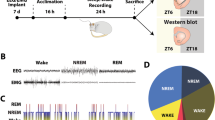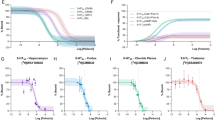Abstract
THERE is general agreement that lithium (Li) impairs central catecholamine transmission, although the underlying mechanism is subject to debate1–4. More ambiguous is the literature describing the behavioural effects of Li in experimental animals. Although considerable evidence indicates that Li suppresses various behaviours5–10, there are reports that this effect is only apparent after drug-induced stimulation11–14. Results are also contradictory with respect to the behavioural effects of long term Li administration, some studies reporting continued or even exaggerated suppression with repeated administration15–18, while others describe development of tolerance to the Li-induced behavioural suppression12,13.
This is a preview of subscription content, access via your institution
Access options
Subscribe to this journal
Receive 51 print issues and online access
$199.00 per year
only $3.90 per issue
Buy this article
- Purchase on Springer Link
- Instant access to full article PDF
Prices may be subject to local taxes which are calculated during checkout
Similar content being viewed by others
References
Colburn, R. W., Goodwin, F. K., Bunney, W. E., Jr, and Davis, J. M., Nature, 215, 1395–1397 (1967).
Katz, R. I., Chase, T. N., and Kopin, I. J., Science, 162, 466–467 (1968).
Katz, R. I., Chase, T. N., and Kopin, I. J., J. Neurochem. 16, 961–967 (1969).
Schildkraut, J. J., J. nerv. ment. Dis., 158, 348–360 (1974).
Cade, J. F. J., Med. J. Aust., 2, 349–352 (1949).
Weischer, M.-L., Psychopharmacologia, 15, 245–254 (1969).
Sheard, M. H., Nature, 228, 284–285 (1970).
Johnson, F. N., Specialia, 15, 533–535 (1972).
Johnson, F. N., and Wormington, S., Nature new Biol., 235, 159–160 (1972).
Smith, D. F., and Smith, H. B., Psychopharmacologia, 30, 83–88 (1973).
Carroll, B. J., and Sharp, P. T., Science, 172, 1355–1357 (1971).
Cox, C., Harrison-Read, P. E., Steinberg, H., and Tomkiewicz, M., Nature, 232, 336–338 (1971).
Steinberg, H., Trans. Biochem. Soc., 1, 93–96 (1973).
Davies, C., Sanger, D. J., Steinberg, H., and U'Prichard, D. C., Psychopharmacologia, 36, 263–274 (1974).
Barratt, E. S., Creson, D. L., and Russell, G., Am. J. Psychiat., 125, 530–536 (1968).
Greenspan, K., Aronoff, M. S., and Bogdanski, D. F., Pharmacology, 3, 129–136 (1970).
Matussek, N., Int. Pharmacopsychiat., 6, 1770–186 (1971).
Sinclair, J. D., Med. Biol., 52, 133–136 (1974).
Baastrup, P. C., and Schou, M., Archs gen. Psychiat., 16, 162–172 (1967).
Schou, M., in Principles of psychopharmacology (edit. by Clark, W. G., and del Giudice, J.), 653 (Academic, New York, 1970).
Schou, M., Trans. Biochem. Soc., 1, 81–87 (1973).
Segal, D. S., in Neurobiological mechanisms of adaptation and behaviour (edit. by Mandell, A. J.), (Raven, New York, in the press).
Segal, D. S., and Mandell, A. J., Pharmac. Biochem. Behav., 2, 249–255 (1974).
Segal, D. S., and Kuczenski, R., Brain Res., 68, 261–266 (1974).
Nagatsu, T., Levitt, M., and Udenfriend, S., Analyt. Biochem., 9, 122–126 (1964).
Kuczenski, R., J. biol. Chem., 248, 5074–5080 (1973).
Corrodi, H., Fuxe, K., Hokfelt, T., and Schou, M., Psychopharmacologia, 11, 345–353 (1967).
Stern, P. N., Fieve, R., Neff, N., and Costa, E., Pharmacologist, 9, 210–215 (1967).
Gershon, S., Ann. Rev. Med., 23, 439–442 (1972).
Segal, D. S., Kuczenski, R., and Mandell, A. J., Biol. Psychiat., 9, 147–159 (1974).
Ho, A. S. K., Loh, H. H., Craves, F., Hitzemann, R. J., and Gershon, S., Eur. J. Pharmac., 10, 72–79 (1970).
Friedman, E., and Gershon, S., Nature, 243, 520–521 (1973).
Segal, D. S., Sullivan, J. L., III, Kuczenski, R., and Mandell, A. J., Science, 173, 847–849 (1971).
Emlen, W., Segal, D. S., and Mandell, A. J., Science, 175, 79–82 (1972).
Segal, D. S., Knapp, S., Kuczenski, R., and Mandell, A. J., Behav. Biol., 8, 47–53 (1973).
Author information
Authors and Affiliations
Rights and permissions
About this article
Cite this article
SEGAL, D., CALLAGHAN, M. & MANDELL, A. Alterations in behaviour and catecholamine biosynthesis induced by lithium. Nature 254, 58–59 (1975). https://doi.org/10.1038/254058a0
Received:
Revised:
Issue Date:
DOI: https://doi.org/10.1038/254058a0
This article is cited by
-
Mood and behavior regulation: interaction of lithium and dopaminergic system
Naunyn-Schmiedeberg's Archives of Pharmacology (2023)
-
Effects of chronic lithium treatment on brain monoamine metabolism and amphetamine-induced locomotor stimulation in rats
Journal of Neural Transmission (1985)
-
Striatal dopamine and motor activity changes observed shortly after lithium administration
Naunyn-Schmiedeberg's Archives of Pharmacology (1985)
-
Effects of lithium on behaviour induced by phencyclidine and amphetamine in rats
Psychopharmacology (1982)
Comments
By submitting a comment you agree to abide by our Terms and Community Guidelines. If you find something abusive or that does not comply with our terms or guidelines please flag it as inappropriate.



